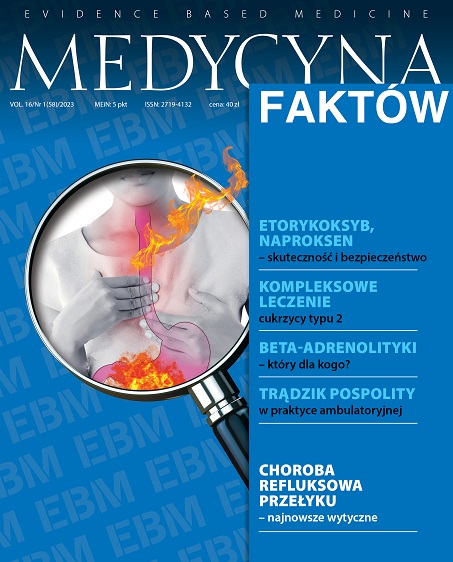Miejsce metforminy w leczeniu cukrzycy w świetle aktualnych zaleceń ADA/EASD z 2022 r. Artykuł przeglądowy
##plugins.themes.bootstrap3.article.main##
Abstrakt
Cukrzyca to choroba epidemiologiczna o progresywnym charakterze. Należy pamiętać o indywidualizacji jej leczenia, indywidualnej ocenie danych dotyczących czynników ryzyka sercowo-naczyniowego, uszkodzenia narządów, wysokości glikemii oraz stanu pacjenta. W najnowszych zaleceniach fundamentem i priorytetem terapii cukrzycy jest redukcja powikłań sercowo-naczyniowych i redukcja śmiertelności. Leczenie należy wdrożyć jak najwcześniej. Już w stanie przedcukrzycowym można włączyć metforminę. W terapii cukrzycy typu 2 pozycja metforminy jest wysoka, gdyż jest to lek silnie obniżający glikemię, znany, stosowany przez lata, z uznanym profilem bezpieczeństwa i dobrą tolerancją. Można ją bezpiecznie stosować w skojarzeniu z innymi lekami hipoglikemizującymi. W warunkach konieczności poprawy kontroli glikemii stanowi silny lek hipoglikemizujący.
##plugins.themes.bootstrap3.article.details##
Copyright © by Medical Education. All rights reserved.
Bibliografia
2. Danaei G, Finucane MM, Lu Y et al. National, regional, and global trends in fasting plasma glucose and diabetes prevalence since 1980: systematic analysis of health examination surveys and epidemiological studies with 370 country-years and 2.7 million participants. Lancet. 2011; 378: 31-40.
3. Boyle JP, Thompson TJ, Gregg EW et al. Projection of the year 2050 burden of diabetes in the US adult population: dynamic modeling of incidence, mortality, and prediabetes prevalence. Pop Health Metr. 2010; 8: 29.
4. Inzucchi S, Bergenstal RM, Buse JB et al. Management of Hyperglycemia in Type 2 Diabetes: A Patient-Centered Approach Position Statement of the American Diabetes Association (ADA) and the European Association for the Study of Diabetes (EASD). Diabetes Care. 2012; 35: 1364-79.
5. Preis SR, Hwang SJ, Coady S et al. Trends in all-cause and cardiovascular disease mortality among women and men with and without diabetes mellitus in the Framingham Heart Study, 1950-2005. Circulation. 2009; 119: 1728-35.
6. Stratton IM, Adler AL, Neil HA et al. Association of glycaemia with macrovascular and microvascular complications of type 2 diabetes (UKPDS 35): prospective observational study. BMJ. 2000; 321(7258): 405-12.
7. Wong ND, Patao C, Malik S et al. Preventable Coronary Heart Disease Events from Control of Cardiovascular Risk Factors in US Adults With Diabetes (Projections from Utilizing the UKPDS Risk Engine). Am J Cardiol. 2014. pii: S0002-9149(14)00547-5.
8. Holmann RR, Paul SK, Bethel MA et al. 10-year follow-up of intensive glucose control in type 2 diabetes. N Engl J Med. 2008; 359: 1577-89.
9. Einarson TR, Acs A, Ludwig C et al. Prevalence of cardiovascular disease in type 2 diabetes: a systematic literature review of scientific evidence from across the world in 2007-2017. Cardiovasc Diabetol. 2018; 17(1): 83.
10. Zalecenia kliniczne dotyczące postepowania u chorych na cukrzyce 2022. Stanowisko Polskiego Towarzystwa Diabetologicznego. Curr Top Diabetes. 2022; 2(1): 1-134.
11. Hundal RS, Kryssak M, Dufour S et al. Mechanism by which metformin reduces glucose production in type 2 diabetes. Diabetes. 2000; 49(12): 2063-9.
12. Viollet B, Guigas B, Sanz Garcia N et al. Cellular and molecular mechanisms of metformin: an overview. Clin Sci (Lond). 2012; 122(6): 253-70. http://doi.org/10.1042/CS20110386: 10.1042/CS20110386.
13. Rena G, Hardie DG, Pearson ER. The mechanism of action of metformin. Diabetologia. 2017; 60: 1577-85. http://doi.org/10.1007/s00125-017-4342-z.
14. Marathe PH, Wen Y, Norton J et al. Effect of altered gastric emptying and gastrointestinal motility on metformin absorption. Br J Clin Pharmacol. 2000; 50: 325-32.
15. Abbasi F, Chu JW, McLaughlin T et al. Effect of metformin treatment on multiple cardiovascular disease risk factors in patients with type 2 diabetes mellitus. Metabolism. 2004; 53(2): 159-64.
16. UK Prospective Diabetes Study (UKPDS) Group. Effect of intensive blood-glucose control with metformin on complications in overweight patients with type 2 diabetes (UKPDS 34). Lancet. 1998; 352: 854-65.
17. Kitabchi AE, Temprosa M, Knowler WC et al. Diabetes Prevention Program Research Group. Role of insulin secretion and sensitivity in the evolution of type 2 diabetes in the diabetes prevention program: effects of lifestyle intervention and metformin. Diabetes. 2005; 54(8): 2404-14.
18. Florez H, Temprosa MG, Orchard TJ et al; Diabetes Prevention Program Research Group. Metabolic syndrome components and their response to lifestyle and metformin interventions are associated with differences in diabetes risk in persons with impaired glucose tolerance. Diabetes Obes Metab. 2014; 16(4): 326-33.
19. Diabetes Prevention Program Research Group. Long-term effects of lifestyle intervention or metformin on diabetes development and microvascular complications over 15-year follow-up: the Diabetes Prevention Program Outcomes Study. Lancet Diabetes Endocrinol. 2015; 3: 866-75.
20. Aroda VR, Knowler WC, Crandall JP et al; for the Diabetes Prevention Program Research Group. Metformin for diabetes prevention: insights gained from the Diabetes Prevention Program/Diabetes Prevention Program Outcomes Study. Diabetologia. 2017; 60: 1601-11. http://doi.org/10.1007/s00125-017-4361-9.
21. Goldberg RB, Aroda VR, Bluemke DA et al. Effect of Long-Term Metformin and Lifestyle in the Diabetes Prevention Program and Its Outcome Study on Coronary Artery Calcium. Circulation. 2017; 136: 52-64.
22. Kitabchi AE, Temprosa M, Knowler WC et al; Diabetes Prevention Program Research Group. Role of insulin secretion and sensitivity in the evolution of type 2 diabetes in the diabetes prevention program: effects of lifestyle intervention and metformin. Diabetes. 2005; 54(8): 2404-14.
23. Diabetes Prevention Program Research Group; Knowler WC, Fowler SE, Hamman RF et al.10-year follow-up of diabetes incidence and weight loss in the Diabetes Prevention Program Outcomes Study. Lancet. 2009; 374(9702): 1677-86.
24. Diabetes Prevention Program Research Group. Long-term effects of lifestyle intervention or metformin on diabetes development and microvascular complications over 15-year follow-up: the Diabetes Prevention Program Outcomes Study. Lancet Diabetes Endocrinol. 2015; 3: 866-75.
25. Aroda VR, Knowler WC, Crandall JP et al; for the Diabetes Prevention Program Research Group. Metformin for diabetes prevention: insights gained from the Diabetes Prevention Program/Diabetes Prevention Program Outcomes Study. Diabetologia. 2017; 60: 1601-11. http://doi.org/10.1007/s00125-017-4361-9.
26. Valencia WM, Palaciol A, Tamariz L et al. Metformin and ageing: improving ageing outcomes beyond glycaemic control. Diabetologia. 2017; 60: 1630-8. http://doi.org/10.1007/s00125-017-4349-5 .
